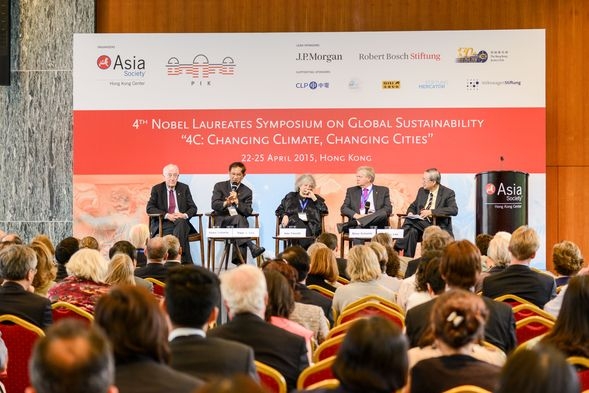Sustaining Humanity in the Midst of Climate Change
A Dialogue with Nobel Laureates

Four Nobel Laureates from around the world kicked off the Nobel Laureates Symposium on Global Sustainability with a public program, “Sustaining Humanity in the Midst of Climate Change — A Dialogue with Nobel Laureates” on Wednesday April 22, 2015 in Hong Kong. Peter Doherty (1996 Recipient of the Nobel Prize in Physiology and Medicine), Yuan T. Lee (1986 Recipient of the Nobel Prize in Chemistry) , Brian Schmidt (2011 Recipient of the Nobel Prize in Physics), and Ada Yonath (2009 Recipient of the Nobel Prize in Chemistry) debated the core problems associated with climate change and discussed sustainable solutions to ensure that humanity can continue to support itself ecologically and economically. Moderated by Gabriel Lau, AXA Professor of Geography and Resource Management, Chinese University of Hong Kong, the laureates discussed these issues in front of an audience of 300 people which was livestreamed online.
“Climate change...looking forward to the next 100 years for humanity is the thing that singularly scares me more than anything else. Why? Because [it] poses the biggest risk to prosperity, society, and civilization as we know it. Why? Because it undermines the ability for the 8-9 or 10 billion citizens that we are going to have on planet earth to live in prosperity,” Brian Schmidt told the audience.
“We sometimes forget just how interdependent we are on each other in the world now, and how efficiently we do operate so that we can have the lives we have. Trying to go through and take one of the big things that we rely on, which is cheap energy, stored up from hundreds of millions of years of solar energy in the form of fossil fuels is a big stress,” Schmidt added.
“Ten years ago when I went around the world, lots of people asked the question, ‘Is climate change real?’ But no more,” Yuan T. Lee noted. “[Today] all the questions are, ‘how can we mitigate, how can we adapt to climate change?’”
“The real concern for me is the variation in climate that’s going to have major real health effects on humans, the variation that’s going to have major health effects on food supplies…this is going to get worse and food prices are going to become unpredictable,” said Peter Doherty. He also highlighted the importance of technical and engineering changes to help address these effects.
The laureates joined five other laureates participating in the three-day Nobel Laureates Symposium on Global Sustainability last week, calling upon cities to tackle the dual challenge of population growth and climate change and seize the opportunity to lead the transition to sustainability. At the end of the symposium, convened for the first time in Asia, the distinguished scientists signed a memorandum. The Symposium was co-hosted by the Potsdam Institute for Climate Impact Research and the Asia Society Hong Kong Center.
The Hong Kong Symposium focused on the role of cities in the face of climate change, under the title “4C: Changing Climate, Changing Cities” – a reference to the fact that global warming, if unabated, will reach four degrees Celsius already by the end of the century.
Video: Watch the complete program (1hr., 21 min.)
.jpg)
Shuttle service generously supported by BMW